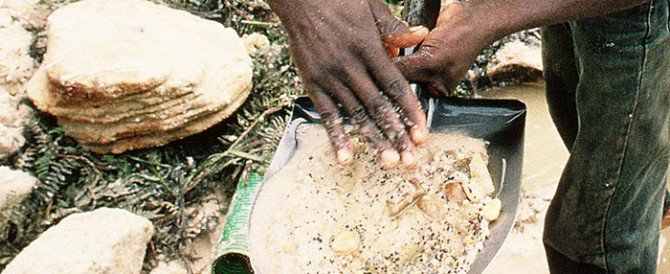The Central African Republic (CAR) is in the midst of one of the world’s largest humanitarian crises. Nearly one fifth of its population is displaced; more than two million people are in dire need of assistance; and a climate of pervasive impunity prevails. Two years since the start of the conflict that brought the country to the brink of collapse and the transitional government is struggling to establish control over its territory. Despite some semblance of calm, hostilities are continuing with reports of killings, lootings and destruction across the country. As civilians continue to bear the brunt of this crisis, there is a pressing need to find sustainable solutions to ensure these atrocities are not left to continue and intensify.
CAR’s history is marred by a legacy of political instability, weak institutions, and predatory rule— resulting in a collapsed economy. The country’s abundant natural resource wealth, including gold, diamonds, uranium, and timber, has invariably failed to translate into equivalent wealth for the people. CAR is estimated to have at least 39 million carats of diamonds still to be mined. With an average price of US$180 per carats, this means that if the entire reserve is sourced, it could yield revenues exceeding US$7 billion. Yet, even before the most recent crisis began, over 70 per cent of the population lived below the poverty line—a number which has increased considerably over the past two years of conflict. Although many acknowledge that CAR’s natural resources are at the heart of the dynamics driving the conflict, discussions on reforming the sector have not been a priority.

Global Witness’ research indicates that both sides of the conflict, the former Seleka and anti-balaka, have profited and are continuing to profit from the exploitation of natural resources. They do so to sustain their operations or for personal gain. At the Ndassima mine alone, former Seleka rebels are making around US$150,000 a year by taxing local gold production. Natural resources from areas under the control of both groups have been smuggled out of the country and have reached international markets. According to the UN Panel of Experts on CAR, two tons of gold are trafficked each year, worth an estimated US$60 million.
Since CAR’s suspension from the Kimberley Process in March 2013, an estimated US$24 million worth of diamonds have made it out of CAR. Evidence gathered by Global Witness also links the timber trade, historically one of CAR’s most lucrative exports, to armed groups and entrenched corruption. This suggests that the armed groups who control or otherwise exploit mines and forests have found ways to access external markets. This dynamic constitutes a major barrier to stability. When natural resources are central to the dynamics of a conflict, they are also an important part of any viable path back to peace.
Despite this trade in the hands of armed groups, the transitional government and some members of the international community are focusing mainly on economic reconstruction. Their eyes too are drawn to CAR’s natural resources. In doing so, they risk repeating old mistakes. A state as fragile as CAR cannot be treated as a normal business partner. A hasty resumption of a natural resource trade is short-sighted when the state lacks the control and legal tools it needs to govern it, and when it cannot hope to monitor what goes on in its mines and forests. Under such conditions, the trade will only fan the flames of conflict and further entrench corruption.
The international community, the government of CAR, and companies involved in the natural resource trade, cannot just address the consequence of the war. They must also consider the means that continue to fuel it.
This means sustained efforts to make sure armed groups and corrupt individuals cannot easily access external markets, such as through targeted sanctions and careful due diligence on resources that may have come from CAR. Once the right conditions are in place, it also means supporting the government to put in place the rules and institutions that can govern a responsible trade. This starts with greater engagement from the international donor and diplomatic community, and with broadening the mandate of the current UN peacekeeping force (MINUSCA). It may even require reflection on the levels of expertise, oversight, and support that credibly emerged from the Governance and Economic Management Assistance Programme (GEMAP) implemented from 2005 in post-conflict Liberia. This programme provided unprecedented hands-on support and expertise from the international community, with the aim of promoting good governance and transparency in key institutions.
A solution to the current conflict, and an economic recovery that can start to help the civilians bearing its cost, must be built on significant reforms to the natural resources sector.
If we want to avoid a repetition of the horrors we have seen throughout CAR over the past two years, CAR’s resource wealth cannot be treated as a cash-pile from which withdrawals can be made without consequence. Two years on, we need to urgently tackle the trade that enables conflict to live on.